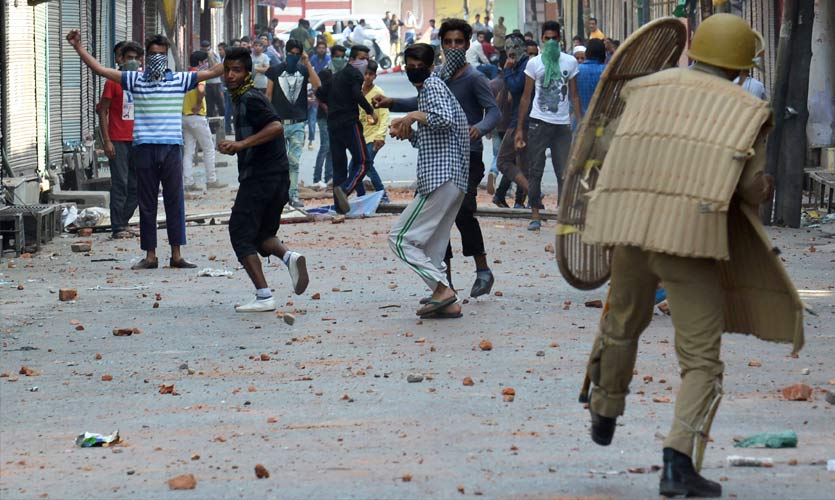The sudden fall of the Afghan government manifests the failure of US foreign policy. With this development, the surrounding region seems to be in imminent trouble as reports indicate that with the rise of the Taliban, other extremist groups such as various factions of the ISIS, Al-Qaeda, Jaish-e-Mohammed, and Lashkar-e-Taiba, will increase their contribution in creating disturbance.
The takeover of Afghanistan by the Taliban has led to apprehensions that it may embolden militants in Jammu and Kashmir, creating a major security concern. The sudden turn of events in the neighbouring country has triggered fresh anxiety among India’s security experts and policy makers who now fear that there could be a surge in the number of pan-Islamic groups in Kashmir, which has been facing the brunt of militancy since decades.
The central government has warned the military personnel stationed in the Kashmir valley, of possible infiltration by foreign militants into India along the weak and porous Afghanistan, as quoted by the Hindu. The report stated that armed militants owing allegiance to the “ISIS-K, Lashkar-e-Taiba and Jaish-e-Mohammed could attempt to aggressively infiltrate into India, particularly Jammu & Kashmir”. There are serious apprehensions that this would not only provide a safe bastion for Islamist extremism in the region but would also encourage radicalisation and terrorism in the Kashmir valley.
Latest reports indicate the presence of foreign militants outnumbering local militants in the northern Kashmir districts of Baramulla, Bandipore and Kupwara. “According to the latest data of the police, there are between 40 to 50 foreign militants active in north Kashmir compared to just 11 local militants,” states one of them. This emerging trend is being viewed with much suspicion and anxiety as the region is witnessing a sudden surge in militant activities. It is also worrying as according to records, it is southern Kashmir that has remained the hub of militant activities after the hanging of the 2001 Parliament attack case convict Afzal Guru in 2013.
Some Indian security officials believe that the sudden withdrawal of the US and NATO forces, and the subsequent rise of the Taliban in Afghanistan will have a negative impact in Kashmir as it will embolden militancy in the region. Pakistan based terrorist outfits could also shift their training camps from Pakistan occupied Kashmir (POK) to Afghanistan to avoid international scrutiny from coming Pakistan’s way.
“In my assessment, there will be a consolidated front comprising China, Pakistan and the Taliban… Kashmir will not remain unaffected…,” says Pravin Sawhney, a renowned defence expert and a former Indian army officer as quoted by the DW. “The Taliban fighters are sons of the soil. They have not given any assurances to the US that they won’t muck around. The Taliban are already controlling most parts of the country. Yes, post-NATO withdrawal, I see definite fallout in Kashmir,” he commented.
Adding fuel to the fire, last week, Taliban spokesperson Suhail Shaheen said, “As Muslims, we also have a right to raise our voice for Muslims in Kashmir, India or any other country.” The statement came just days after the Al-Qaeda celebrated the Taliban’s victory and said that now it might turn its attention to Kashmir next, to liberate it from the enemies of Islam.
Voices from different sections of Pakistan have signalled that Kashmir now faces an imminent threat of terror spilling into its territory from both Afghanistan and Pakistan. Last month, Neelam Irshad Sheikh, a leader belonging to Prime Minister Imran Khan’s Pakistan Tehreek-e-Insaf party, said that Taliban leaders had told them they were “with” Pakistan and that they would help them in Kashmir.
Militancy in Kashmir is organically linked to covert wars fought in Afghanistan. The Mujahideen, a coalition of Afghan fighters, were funded and supported by the US and Pakistan against the Soviet invasion, and fought a bitter war between 1979-1989. The defeat of the Soviet Union coincided with the rise of armed insurgency in Kashmir amidst the 1987 legislative election in the state, which provided an ideal base for Pakistan to exploit the situation. The Kashmir valley has witnessed the advent of hundreds of armed fighters from Afghanistan, Pakistan-occupied Kashmir and West Asia entering from across the Line of Control (LoC) since.
Read more: Two Years After The Abrogation Of Article 370, J&K’s Situation Remains Uncertain
For the past few years, and especially after the abrogation of Article 370 and 35A, Kashmir has been witnessing a reduction in the presence of foreign militants in the valley. “For example, in 2019, 130 infiltrations were recorded across the LoC, while only 30 managed to infiltrate into the Kashmir Valley from January to October 2020,” states the ORF.
Looking at the grave situations prevailing in Afghanistan, Pakistan can exploit these situations and radicalise the Kashmiri youth against India by bringing in the subject of puritan Islam and abrogation of Article 370 and 35A. While it is too early to predict the lasting impacts of power shift in Kabul, New Delhi will have to continue keeping a close eye on the situation unfolding in the region.










